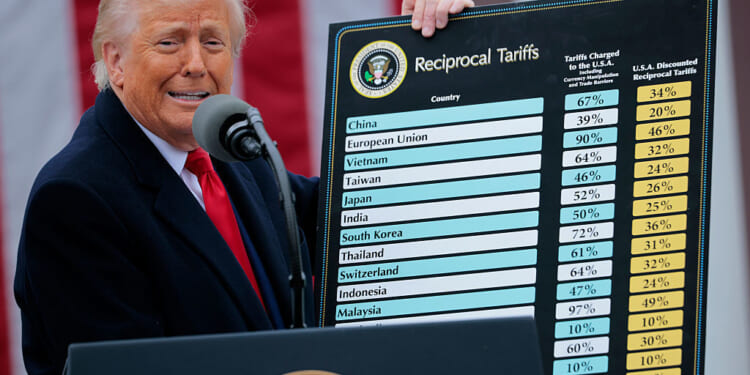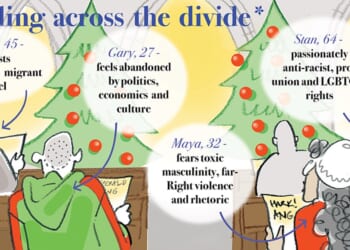
Analysts who draw inferences from election data have a tendency to overinterpret. Already, politicians have attributed Democratic victories in the 2025 off-year elections to the government shutdown, the filibuster, and the socialist takeover of the Democratic Party. But Occam’s Razor applies to elections as much as to anything else: all other things being equal, the simpler explanation is likely the correct one. And the simplest explanation for any American election result has remained consistent for decades: “It’s the economy, stupid.”
In late September, Pew Research found that nearly three-quarters (74%) of Americans rated the economy as “fair” or “poor,” while only 26% viewed economic conditions as “excellent” or “good.” Even among Republicans, less than half (44%) viewed the economy positively. This represented only minor gains over 2022, while more than half of Americans thought positively about the economy during Trump’s first term, before the COVID pandemic.
At least some of this economic dissatisfaction is naturally tied to President Trump, as the incumbent. In the same Pew survey, 53% of respondents said Trump’s policies had made the economy worse, but only 24% said his policies had made the economy better (and 22% believed they did not have much effect).
On Election Day, only 41.4% of American voters approved of President Trump’s handling of the economy in the Real Clear Politics polling average, compared to 54.8% who disapproved. Trump’s overall approval was similar, with 43.3% average approval and 54.5% average disapproval.
President Trump himself tied the economy to election results during a Wednesday speech at the American Business Forum in Miami. “It’s really easy to win elections when you talk about the facts. And we have more people working now than at any time in the history of our country,” he said. “These are things you have to talk about. It doesn’t just happen, you got to tell them. It’s wonderful to do them, but if people don’t talk about them, then you can do not so well in elections.”
Those whose memories were not erased 12 months ago may recall a time when the Biden White House made the exact same argument. “Good jobs and lower costs: That’s Bidenomics in action,” insisted President Joe Biden in July 2023, sketching an over-rosy picture of an economy bleached out by years of high inflation. The month before, a survey showed that only 34% approved of Biden’s handling of the economy.
President Biden made the fatal mistake of believing that voters’ sour opinion of his economic policies was due to problems with his messaging, not to problems with the economy. President Trump appears to be in danger of falling into the same trap.
Like Biden before him, Trump has taken ownership of this economy. “One year ago, we were a dead country. Now we’re a country that’s considered the hottest country anywhere in the world,” he boasted, listing off foreign investment pledges, high growth in the 2nd quarter of 2025, 1.9 million more jobs for “American-born workers,” and the lower estimated cost of Thanksgiving dinner. “And it’s been really helped a lot by the tariffs,” he added.
The government can do a lot to influence macroeconomic statistics. But voters measure their economic well-being by comparing their paycheck to the cost of living. No politician can argue voters into or out of the perception of the economy created at the checkout counter. And voters understand that these statistics are, at best, a cherry-picked description of the U.S. economy.
At the same time, Trump also seemed conscious about voters’ chief concerns. “Day by day, we’re making America affordable again. It’s going to be affordable again at a really record pace,” he declared.
In many ways, this issue defined the 2025 election. The economy was a top issue for voters in those states that had key elections this week. A Virginia exit poll found that 47% of respondents rated the economy as the most important issue, with health care in a distant second place at 21%. In a New Jersey exit poll, 36% of respondents rated taxes as the top issue, 32% said the economy, and health care finished a distant third (16%).
This places the 2025 election squarely in line with many previous elections. “One could very easily read the results of the last three presidential elections as a function of the American people firing the incumbent party and turning to the opposition party in a desperate attempt to get the economy moving again,” reflected National Review Executive Editor Mark Antonio Wright.
“In 2016, the American people took a flier on Trump … to extricate the country from the sluggish growth of the post-financial crisis Obama years,” he listed. “In 2020, the American people, exhausted by the chaos, turmoil, and pain of the pandemic year, gave Joe Biden a chance at a ‘return to normalcy.’ In 2024, the American people, frustrated by Biden-era inflation, fired the Democrats and gave Trump a chance at bringing back the economic conditions of 2017–2019.”
One might follow this line of thinking all the way back to 1992, when Bill Clinton shellacked incumbent President George H. W. Bush by five million votes with slogan, “It’s the economy, stupid.”
So, what’s ailing the economy now? One problem is the bloated federal budget, which has largely calcified the COVID-era’s unsustainable deficits, displacing private industry and raising the cost of ever raising the interest rate — not exactly Trump’s fault. Another problem is President Trump’s tariffs, an added tax burden forcing the economy to run with ankle weights. A third problem is inflation, which still hovers at around 3% annually, 50% higher than the Federal Reserve’s optimal target, which means the high prices Americans loathe continue to rise ever higher.
“We had the most successful economy in the history of our country during my first four years,” reminisced the current and former president. “We rebuilt the economy, cut the biggest tax cut in history. We had the biggest tax cut in history, the biggest regulation cut in history. That’s why we had the great economy.”
Hyperbole aside, American voters would love to return to the economic conditions of 2019, and they are ready and eager to vote for any candidate who can take them there. But worldwide tariffs were not part of that economic success. And, while the 2017 tax cuts are now permanent, the Republican trifecta has failed to substantially shrink the budget that ballooned during COVID.
For all the lessons that politicians draw from the 2025 election, Republicans should learn that voters are dissatisfied with the economy, and they want to see real change.
Originally published at The Washington Stand.
Joshua Arnold is a senior writer at The Washington Stand, contributing both news and commentary from a biblical worldview.

















